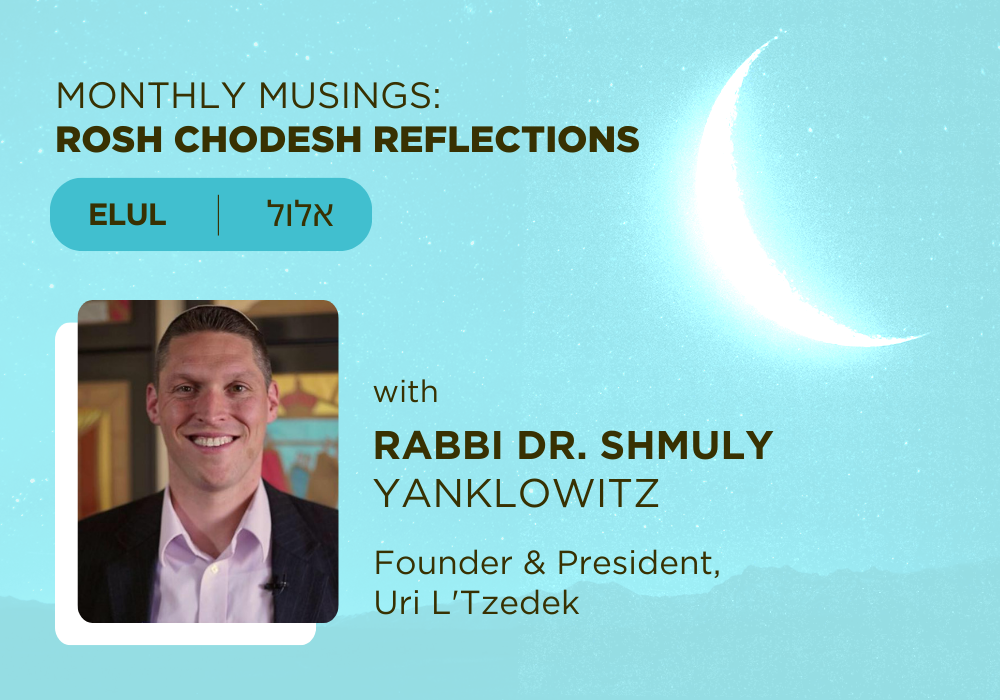Monthly Musings: Building a Better World, Wherever We Are

Rosh Chodesh Elul calls upon us to pause, reflect, and realign with our values. Rabbi Dr. Shmuly Yanklowitz offers insight into how service, in every form and place - whether abroad or in our own neighborhoods - can transform both the world and ourselves.

Q: In recent years you've shifted from global toward local service. What values or experiences have carried over in that work?
R. Yanklowitz: When I was in my early 20s, my focus was primarily global. I was traveling, partnering with organizations abroad, and engaging with people living in extreme poverty. Over time, my energy has shifted more toward local and national service.
Part of that shift came from an uncomfortable realization: Global work can feel exciting, even glamorous. It’s easy to get excited by “global work” as it feels there is so much room to create change. There is still so much potential for impact if we look at local and national work though. Unfortunately, there is a lot of need everywhere.
When I was honest with myself, I had to admit that being more proximate to the people I was serving often meant I could be more effective. I could show up consistently. I could build deeper, more authentic relationships. I could see projects through in a way that wasn’t always possible when I was on the other side of the world.
Ironically, it was my global work that taught me how to see my own backyard. Exposure to extreme poverty abroad opened my eyes to the struggles right here in Phoenix, where neighbors are battling the relentless summer heat without shelter, or where immigrant families are navigating a maze of legal, economic, and cultural barriers. Once you’ve seen suffering in one context, you can’t unsee it in another.
The values I carried over from my global work are the ones that now guide me locally. First, the understanding that every act of healing, no matter where it happens, is part of tikkun olam. You don’t have to be on another continent to be repairing the world. Helping people in your community live with dignity is just as much a contribution to global healing as any large-scale project overseas.
Second, I learned the importance of cultural sensitivity. In global work, you’re hyper-aware of difference like language, customs, social norms. Locally, it’s easy to assume you share the same culture as the people you serve, but that’s not always the case. Our cities are full of diverse subcultures, immigrant communities, and lived experiences that require the same humility and listening as any international mission.
Finally, I learned sustainability. It’s one thing to fly in, help for a week, and leave. It’s another to commit to being there year after year, walking alongside people as they navigate the slow, sometimes frustrating path to change. Local work allows for that kind of sustained presence.
So while my focus may be closer to home now, it’s not a retreat from global responsibility. I still work to support vulnerable children overseas in places like in our child welfare work in Rwanda and Israel. It’s important to understand that the world is interconnected, and that sometimes the most impactful way to change it is to start right where you are.
Q: How might Elul push us to recommit to service — whether across the world or across the street?
R. Yanklowitz: As the year winds down, Elul calls us to reflect. Every year brings its share of highs and lows, and yet, too often we dwell on the shortcomings and the worries.
Let’s shift our focus toward the blessings in our lives and cultivate a strong sense of gratitude to our Creator. Look around: the roof over your head offering shelter, the shoes protecting your feet every day, the traffic lights quietly keeping order and safety, the trees and open land offering beauty and a serene place to be present.
I often think about those facing extreme poverty on the other side of the globe. As climate change accelerates, humanity must learn to manage significant challenges: more severe natural disasters, deeper droughts, rising insect-borne disease, and much more.
Closer to home, I can’t help but notice my neighbors in Phoenix, Arizona, who were dealt a difficult hand and now have to find ways to survive the extreme Arizona Summer heat. As Jews, a people that have been through so much suffering, we should feel a moral responsibility to offer a hand to the most vulnerable.
I often think of a well-known excerpt from the Gemarah: “When the community is immersed in suffering, a person may not say: I will go to my home and I will eat and drink” (Ta’anit 11a).
While I often think about those in dire need of aid, I recognize that we must find peace within ourselves before we can bring peace to the world, whether on a global or local scale. As we work on our inner selves, the larger challenges begin to feel more attainable. From that place of strength, we can face both global and local issues with full conviction and purpose.
This holiday season, let’s dig deep. Rosh Hashanah and Yom Kippur are not just holidays, days off work, or just a fast that we have to endure. They are sacred opportunities to seek spiritual clarity, cultivate inner peace, and strengthen our connection with the Divine. Our full potential is only unlocked through moral clarity and integrity. When we transform our character, we gain the power to transform the world.



.png)
